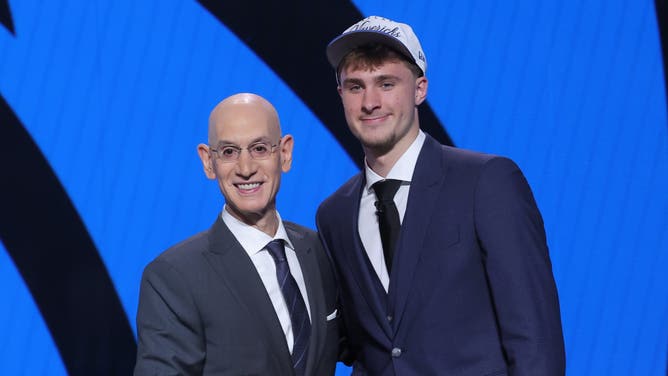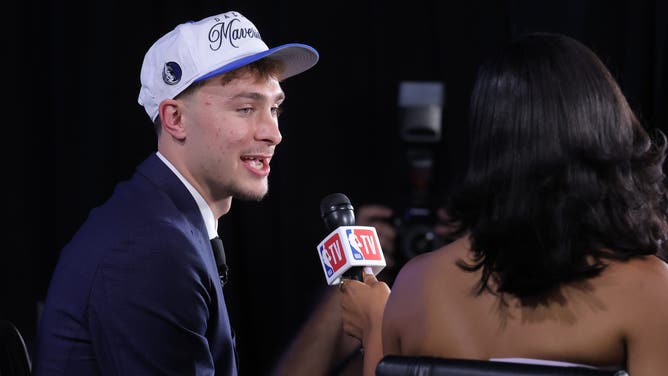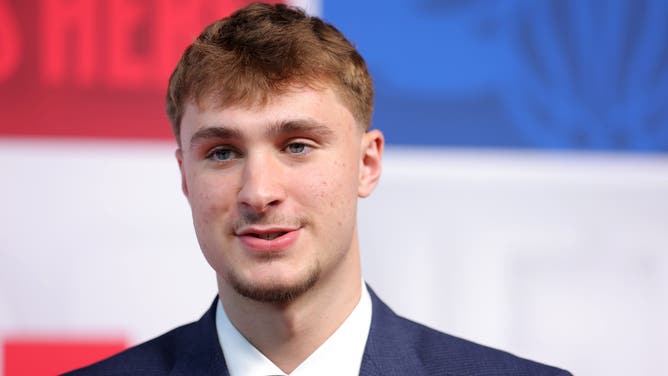This Is Why I Asked Cooper Flagg About An NBA Conspiracy Theory Surrounding Mavericks, Luka Doncic | Dan Zaksheske
Many people believe the NBA rigged the draft lottery for Dallas
To the surprise of not one single human being on the planet, the Dallas Mavericks used the #1 overall pick in the NBA Draft to select Duke freshman Cooper Flagg on Wednesday night.
Flagg was the consensus top prospect in the draft, and he was always going to be the top pick. The question came down to which team would win the NBA Draft Lottery on May 12 and earn the right to select the 18-year-old American.
When the Dallas Mavericks won the lottery, many people started to question the process. It was a little suspicious that a team with just a 1.8% chance of securing the top pick won, especially considering the Mavericks completed one of the most shocking trades in NBA history just a few months prior.
In early February, Dallas shipped its franchise player, Luka Dončić, to the Los Angeles Lakers in a three-team deal that also involved the Utah Jazz. In return, the Mavericks received Anthony Davis. A very large group of people wondered if the league might have tipped the lottery scale in favor of the Mavericks in exchange for sending a superstar to L.A.

Several people questioned OutKick's decision to ask Cooper Flagg about an NBA conspiracy theory surrounding the Dallas Mavericks, the #1 pick, Luka Dončić and the Los Angeles Lakers.
(Brad Penner/Imagn Images)
I ddi not invent the conspiracy theories and, quite frankly, I don't even believe them. I think it's perfectly reasonable that the Dallas Mavericks didn't want to give Dončić a supermax contract, so they shipped him out.
Yes, winning the lottery with a 1.8% chance is unlikely. But it's not unfounded. Plenty of teams with terrible odds have won draft lotteries in the NBA and NHL. It happens. But the noise was loud enough that it seemed appropriate to ask Cooper Flagg – one of the central figures in all of this – about those rumors.
OutKick asks Cooper Flagg about NBA conspiracy theory
Flagg had a press conference about an hour after being drafted by the Mavericks. Prior to that press conference, he did interviews with ESPN television, ESPN Radio, and NBA TV (and probably a few more). After the press conference, he met individually with several more prominent media figures.
I bring that up because Flagg answered about 50 questions on Wednesday night (and that's not even counting the ones he answered leading up to the NBA Draft).

Cooper Flagg is interviewed by NBA TV after being selected as the first overall pick by the Dallas Mavericks in the 2025 NBA Draft.
(Brad Penner/Imagn Images)
So, when it was my turn to ask a question (the one chance I had throughout the entire process), I asked about those conspiracy theories that have dominated the Internet for over a month.
Now, to be clear: the question was very much tongue-in-cheek, which is why I began with "On behalf of all the Internet conspiracy theorists who couldn't be here tonight…" You see, that's a joke. Flagg even chuckled when I started with that.
Of course, I knew Flagg wasn't going to say, "Yeah, they rigged the lottery and told me about it." I figured he would answer exactly how he answered, which was to say that he had no idea about that, and he's happy that he ended up with the Dallas Mavericks.
But that didn't stop people from attacking me on the Internet for asking in the first place.
Here's why the criticism of my Cooper Flagg question is dumb
The keyboard warriors quickly lined up to bash me for asking Cooper Flagg about the NBA Draft Lottery conspiracy theory. Before we even get to the specific criticisms, I'd like to point out that arguably the biggest storyline surrounding this year's NBA Draft was the theory that it was rigged for the Mavericks.
The fact that no one else had even asked Flagg about it to that point is on them, not on me. It's the job of the reporters to ask questions about the biggest stories. It was a journalistic failure that we got all the way to draft night without the question being posed.
"You shouldn't have asked Cooper Flagg that because he had nothing to do with it."
This is the only legitimate criticism that I saw after asking the question. I do understand where people are coming from on this one, although I disagree. Flagg is the central figure in the conspiracy theory, and it's totally inbounds to ask him about it. As I mentioned, I never expected him to say he was in on it. But that shouldn't have precluded anyone from simply asking the question.
As far as asking Flagg and not NBA Commissioner Adam Silver or Mavericks GM Nico Harrison, I didn't have the opportunity to speak to either of them. Silver didn't do any media at the NBA Draft, or I would have asked him. Harrison had a private media availability so I couldn't have asked him. I would have, though.
Finally, asking that question and his subsequent answer was probably the most newsworthy moment of any interview that Flagg did on Wednesday night. And he did A LOT of interviews. Doesn't that show that the question was worth asking? People are clearly interested in the theory and Flagg's response. The job of a reporter is to get the answers to questions that people have. People are wondering about the conspiracy theory. Reasonable question. Next.
"That wasn't the time to ask that question, this was the biggest night of this kid's life!"
Yeah, yeah. I'm used to this one. The same thing happened when I asked Dawn Staley about biological men competing in women's sports prior to the Women's NCAA National Championship. Let me ask these people a question right back: when, exactly, is the right time to ask a question?
Since you all seem to be the arbiters of when the appropriate time to ask a question is, please enlighten me with your wisdom.
Arguing that it's inappropriate to ask Cooper Flagg about an NBA Draft conspiracy theory on the night of the … checks notes … NBA Draft seems patently absurd. I'd argue there's not a single better time to ask that question. As far as it being "the biggest night of his life," I'm not even sure how that is relevant, so I'm not even going to address that nonsense.
"It was a stupid question and cost someone else the chance to ask a better one."
I've already addressed this, but I'll repeat myself. Cooper Flagg spoke to the media ALL NIGHT on Wednesday. He was asked probably 50 questions. In many cases, he was asked the same question multiple times. What, exactly, didn't get asked of Cooper Flagg after he was picked in the NBA Draft? I'll wait.

Several people questioned OutKick's decision to ask Cooper Flagg about an NBA conspiracy theory surrounding the Dallas Mavericks, the #1 pick, Luka Dončić and the Los Angeles Lakers.
(Brad Penner/Imagn Images)
Should I have asked him the question that the person after me asked?
"Cooper, is the goal to win an NBA Championship next season?" Wow, what a great question that was. So glad that "reporter" didn't waste his question on something dumb.
Maybe I should have asked an insightful question, like the person who went a little bit later: "What was the most expensive thing you ever dreamt of buying when you became [an NBA player]?" Man, that's some hard-hitting journalism right there.
"You should have your media credentials revoked for asking Cooper Flagg that question."
Man, I wish I got a dollar every time someone demanded I have my media credentials revoked. I'd be a very rich man.
This is the most insidious criticism of all. The idea that people are so quick to demand a loss of access for asking questions really speaks to where we are as a society. I understand that freedom of speech doesn't apply to private entities, like sports leagues, but the idea that a media credential should be revoked over things like this is a terrible sign for the state of a free society.
The problem is that people live in their own bubbles and demand that any speech that they don't like needs to be silenced. That should not happen in the United States. If you're one of the people demanding access be removed for speech you don't like, it's time to take a long look in the mirror.
So, to all the haters out there attacking me online for my question, I respect your right to have an opinion. It's OK to be wrong! That's what makes America great. I'm not going to call for you to be fired or have your social media access taken away just because you think differently.
Even if you don't extend that same courtesy to me, I'm OK with it. I stand behind the principles of free speech no matter what. Perhaps you should all try it, too.